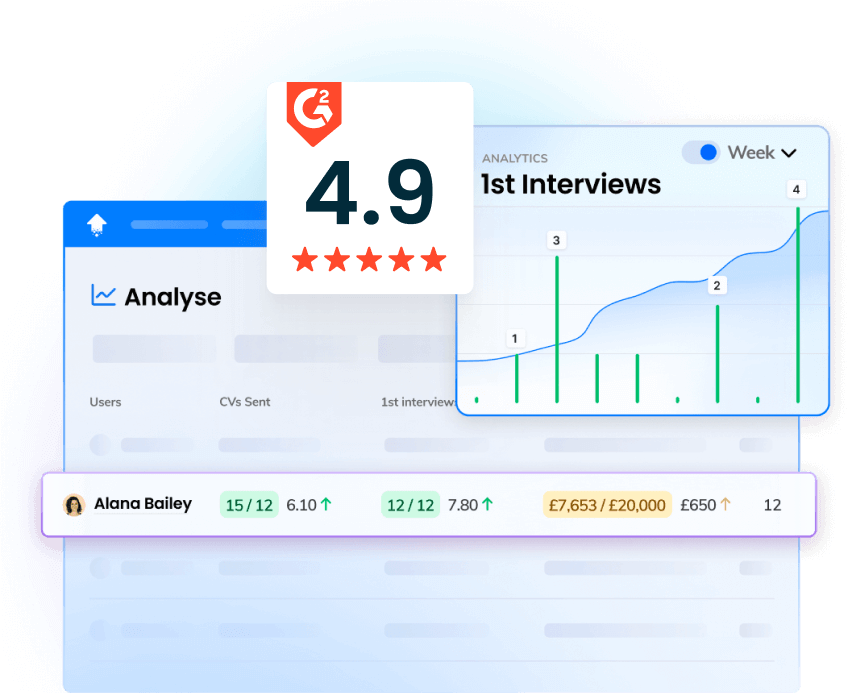A recruiter scorecard is a tool that empowers recruitment leaders to systematically assess the performance of individual recruiters.
This is an essential tool for any modern recruitment agency.
After all, it's impossible to build a high-performance team if you don't know how effective your recruiters are or where their strengths and weaknesses lie.
Defining the Recruiter Scorecard
Recruiter scorecards are documents that contain a series of key metrics, such as time-to-fill and placements filled, that shed light on recruiter performance.
Different metrics can be given different weightings. For example, you may choose to put more emphasis on time-to-hire than you do offer acceptance rate.
The scores for each metric are then combined, with weightings taken into account, to give each recruiter a number that reflects their performance.
This may be a score out of ten or 100 or a ranking within the team.
The scorecard can also contain benchmarking data — for example, the highest scores on the team or the historic average — allowing recruiters to quickly see how they perform compared to their colleagues.
Please note, sometimes the term 'recruiter scorecard' is used to refer to an interview scorecard — a different tool handy for developing structured interviews and interview questions, and ranking candidates fairly.
In this guide we will be covering only scorecards designed to enhance recruiter performance.
Essential Recruiter Scorecard Metrics
The metrics you choose for your scorecards for recruiters should reflect your agency's goals and specific circumstances.
However, most recruiter scorecards will include the following key metrics:
- Time-to-fill and time-to-hire
- Quality of hire
- Candidate source tracking
- Cost per hire
- Diversity and inclusion metrics
- Offer acceptance rate
- Funnel metrics and conversion rates
Advantages of Implementing Recruiter Scorecards
Implementing recruiter scorecards isn't just advantageous — in modern recruitment agencies, it's vital.
Here are the top five positive changes you'll notice after implementing recruiter scorecards.
#1 Enhanced Recruiter Performance
Implement a structured approach to tracking and improving recruiter performance, and it will become much easier to capitalise on team members' strengths and troubleshoot their weaknesses.
If you don't use a scorecard for recruitment, you might realise that one of your recruiters is underperforming — but it may not be clear where they're lacking.
In addition to allowing you to troubleshoot poor recruiter performance, scorecards are motivational tools for recruiters.
After all, no one wants to discover that they're performing poorly compared to their colleagues.
Scorecards that rate recruiters against each key metric illustrate precisely where each team member needs to dedicate their time and energy to get better at their job.
#2 Data-Driven Decision-Making
Going with your gut just doesn't cut it any more.
In 2024, top recruitment agencies are making data-based decisions — putting them head and shoulders above the competition.
Arm yourself and your recruiters with accurate, real-time data about their performance to enable data-driven decision-making around key performance metrics.
For example, suppose one recruiter consistently scores low on candidate satisfaction. In that case, you may decide to dig deeper into the data to find out what is going wrong or send them for training around effective communication.
A second recruiter might have a phenomenal track record when it comes to candidate satisfaction, but their time-to-hire is sky-high. Armed with this knowledge, you now know you need to delve into the data to determine which stage of the recruitment funnel they're getting stuck at. And then provide relevant training.
Keeping track of recruiter performance in a structured way means you don't have to start from scratch to find out why agency performance has dipped.
It also means you'll spot potential issues before they snowball instead of constantly firefighting problems that have already escalated.
#3 Improving Accountability and Transparency
It's hard to argue with data.
That's why regularly presenting your recruiters with the cold, hard facts of their performance can improve accountability.
It minimises excuses and encourages them to take responsibility for their performance and improve it before the next scorecard lands.
Recruiter scorecards, by nature, improve your team's transparency.
In 2024, you need to be making data-driven decisions — but so do your recruiters.
This means no more gatekeeping.
Instead, equip your team with in-depth data surrounding their performance and watch it improve.
Here's an example.
Say a recruiter consistently scores low on the quality of hire.
They may be aware this isn’t their strong suit, but they may not be aware that they rank significantly lower than average in this area.
Once you make them aware of the issue, they may well make the data-driven decision to expand their channels or be more selective within the screening process.
These actions should lead to higher-quality hires from that recruiter in the future.
#4 Streamlining the Recruitment Process
When your whole team pushes in the same direction, the recruitment process becomes beautifully streamlined and much more effective.
After all, without SMART goals and targets to work towards, it's hard for recruiters to know exactly what you want from them — beyond "bring in more commission".
A scorecard in recruitment will help you to align recruiters' individual goals with broader business objectives to ensure they're focusing on the activities that are most important to you.
Furthermore, the metrics within a recruiter scorecard break down the recruitment process into easily understandable results.
It's now easy for leaders to detect exactly where problems exist within the recruitment process and swiftly rectify them.
For example, the recruitment funnel metrics on the scorecard should indicate how long candidates spend within each stage of the recruitment funnel.
If one recruiter's candidates consistently remain in the application stage or within the interview process for much longer than average, it's important to talk to that recruiter to find out what's going wrong.
Maybe there are technical difficulties with the application form, maybe it's not clear enough and candidates are regularly filling it in wrong, or perhaps they're waiting to hear back from the client on their approved candidates.
Whatever the issue, you should be able to step in and advise the recruiter on how to speed up this stage of the funnel.
Once your recommended actions have been taken, your overall recruiting process should become quicker and more streamlined.
#5 Better Resource Management and Allocation
Recruiter scorecards also lead to enhanced resource management and allocation.
Not every recruiter needs the same amount of time to get the same results.
For example, imagine your scorecards reveal a recruiter on your team with a knack for speedy sourcing who consistently delivers top-quality candidates.
You may put them in charge of sourcing for all roles or incentivise them to train or mentor their colleagues.
Conversely, you might reduce the time they currently allocate for sourcing and dedicate it to an area in which they struggle more—for example, the offer stage.
The important thing is that thanks to the scorecard structure, you're now aware of this asset — but what you choose to do with that information is up to you.
Steps to Develop an Effective Recruiter Scorecard
So now we know how effective recruiter scorecards are at improving performance — how can you create one for your team?
Here's our four-step plan for developing an effective recruiter scorecard:
#1 Identifying Key Performance Indicators (KPIs) that Matter
Every agency's recruiter scorecards will look different because every agency's business objectives are different.
Recruiters on one team may even have different scorecards to align with their goals.
To create the most effective scorecards for your agency, identify the key performance indicators that matter to you.
For example, if, like many agencies, you're on a cost-cutting drive, you may focus on KPIs such as cost per hire, time to hire and sourcing channel efficiency.
On the other hand, if you're looking to build a loyal client base, KPIs such as hiring managers' satisfaction, candidate satisfaction, future job performance, and first-year attrition rate may be more important to you.
Looking to streamline your processes? Your scorecards will likely be based heavily on KPIs related to the recruitment funnel.
#2 Setting Clear and Achievable Goals
Once you've identified your KPIs, it's time to set goals for your recruiters.
Getting this right is instrumental to ensuring your scorecards do what you want and need them to do.
Start by conducting a benchmarking exercise.
Use data to identify how your team and each recruiter have historically performed around each KPI on average.
Depending on your circumstances, you may want to look at the past month, quarter, or year.
Your goals themselves should be clear, achievable, and SMART.
SMART goals are:
- Specific
- Measurable
- Achievable
- Relevant
- Time-Bound
So instead of setting a goal such as:
"Improve hiring manager satisfaction"
Set SMART goals like:
"Improve hiring manager satisfaction to [X]% by [date]."
When goal-setting, it's essential to consider benchmarking data and unique circumstances surrounding the team, company, or sector to ensure your goals are achievable.
For example, you may want to relax your monthly targets if the recruiter in question is on annual leave for two weeks of the month. Similarly, if the recruitment market has taken a considerable dip, it would be unfair to expect your recruiters to overcome these conditions single-handedly.
#3 Data Collection and Analysis Methods
To track your scorecard KPIs, you must develop a standardised method of collecting, collating, and analysing your data.
But don't worry — in 2024, this is less about taking a data science course and more about investing in cutting-edge software.
Recruiting analytics software OneUp offers custom dashboards with beautiful visualisations that make tracking your team's performance easy and intuitive.

A wide range of integrations pull data from your tech stack in real time. Draw data from your recruitment management system, candidate relationship management software, or applicant tracking system, At the same time, a user-friendly interface makes it super easy to analyse this information for data-driven decision-making.
#4 Regular updates and reviews of the scorecard
It's no good simply creating scorecards, telling your team about them, and then locking them in a drawer, forgotten for the rest of the year.
For your scorecards to effectively boost performance, you and your team must genuinely engage with the process.
This means building regular scorecard updates and reviews into your schedule from the launch.
You could create weekly, monthly, or quarterly scorecard reviews or simply incorporate them into existing one-on-ones with team members.
During your scorecard reviews, you should go through the most recent set of results, track their historic progress, and be transparent about how their colleagues are performing.
It's also important to regularly consider whether the KPIs you're tracking are still serving your purposes, or whether it's time for a change.
Best Practices for Using Recruiter Scorecards
You don't want to put time and effort into recruiter scorecards only to have the project flop.
To avoid pitfalls, it's important to follow these five best practices for using recruiter scorecards.
- Onboarding and training for recruitment teams are essential to ensuring your scorecards have the desired effect. Recruitment leaders must clearly communicate the purpose of the scorecards, how they will work, and any incentives for hitting goals. Mandatory training on how to use any new software must be provided.
- Integration with existing recruitment tools and platforms should be at the top of your list when considering which recruitment analytics tool to invest in. Purchasing a software that integrates with your existing tech stack makes implementing scorecards much quicker and easier — not to mention less costly.
- Automating data collection and reporting processes will save you a tremendous amount of time and ensure a higher level of consistency and accuracy for your scorecards. Ensure your new recruiting analytics software comes with automation capabilities.
- Fostering a culture of continuous improvement means consistently tracking the impact of your scorecard approach and honing it over time for optimal results.
- Utilising technology for real-time insights allows you to check recruiters' progress at any time and gain a helpful overview of your agency's activities. OneUp boasts a wide range of integrations that pull data from across your tech stack in real-time straight to your custom dashboards.
How OneUp Enhances Recruiter Scorecard Effectiveness
With a host of integrations, OneUp automatically pulls data from your existing tech stack in real-time, giving you a to-the-minute overview of your agency's performance whenever you need it.
OneUp's user-friendly interface makes it easy to set up custom dashboards for individual recruiters and teams tailored to their scorecard KPIs, while intuitive visualisations allow users to analyse data at a glance.
It's easy to perform a deep dive into the data to determine exactly where things are going wrong (or right) and swiftly attend to any issues.
OneUp's automation allows you to save time on reporting, with automated reports sent out when you need them.

If, for example, you plan to update your recruiters' scorecards monthly, simply build each report once in OneUp and then automate it every month.
OneUp also offers a suite of motivational tools, such as leaderboards, leagues, challenges, and missions, empowering recruitment leaders to drive high performance.
Templates and Examples of Recruiter Scorecards
As outlined above, every recruiter performance scorecard will look different, and the scoring system will vary.
They will contain different metrics, measure different time periods, and be benchmarked against different stats.
For an insight into industry benchmarks, read our State of Recruitment 2024 report.
However, if you're looking for a recruitment scorecard template, you'll find three below.
#1 General Recruiter Scorecard
The first recruitment scorecard format is a general example that could apply to most agencies and recruiters.
| KPI | Target | Recruiter Score | Agency Average | Agency High Score |
| Time to fill | ||||
| Time to hire | ||||
| Quality of hire | ||||
| Cost per hire | ||||
| Candidate satisfaction | ||||
| D&I score | ||||
| Offer acceptance rate | ||||
| Conversion rate |
#2 Recruiting scorecard for boosting efficiency
Our next recruiting scorecard template is geared towards enhancing efficiency within your agency.
| KPI | Target | Recruiter Score | Agency Average | Agency High Score |
| Time to fill | ||||
| Time to hire | ||||
| Attrition rate | ||||
| Cost per hire | ||||
| Applicants per opening | ||||
| Sourcing channel | ||||
| CVs : Interview ratio | ||||
| Interview : Job Fill ratio |
#3 Recruiter Scorecard for Increasing Productivity
Our final sample recruiter scorecard is designed to boost productivity with a close look at your recruiter's activities.
| KPI | Target | Recruiter Score | Agency Average | Agency High Score |
| Time to fill | ||||
| Time to hire | ||||
| Cost per hire | ||||
| BD calls made | ||||
| CVs sent | ||||
| Candidates sent per job |
Final Thoughts…
Recruiter scorecards are a handy tool for tracking and improving the performance of reps on your team.
And the reason they work so well is because they are data-driven.
Recruiter scorecards provide a solid framework for building data-driven performance reviews into your workflow.
This is effective in boosting recruiter performance, empowering data-driven decision-making, improving accountability and transparency, streamlining the hiring process and enhancing resource management.
But for your recruiter scorecard framework to have the desired effect, you must invest in a strong recruiting analytics software that integrates with your existing tech stack and has all the functionality you need.
OneUp is an outstanding tool for optimising recruitment efforts. To find out more, book your demo here today.




